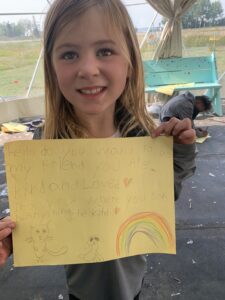Navigating the Intricacies of Elementary School Relationships: Bullying, Mean Moments, and Learning Opportunities
by Kristi Kraychy, Head of School

Elementary school is a pivotal stage in child development, setting the foundation for interpersonal skills and self-awareness. Understanding the nuanced differences between bullying, mean moments, and opportunities for learning is crucial for both parents and educators. This clarity can inform constructive guidance, especially when a pause for reflection could be more beneficial than immediate intervention.
Bullying: A Deliberate and Sustained Harm
Bullying is a targeted, repeated form of aggression intended to harm or belittle another person. Bullying often involves a power imbalance with one person exerting their power over the victim who may be younger, weaker, appear to be different in some way, may have special needs, or belongs to a vulnerable minority group. The victim often feels trapped, helpless, and anxious about future encounters and they are typically targeted without provocation or reasonable justification. Bullying can have long-lasting emotional and psychological repercussions that necessitate immediate and serious action.
Mean Moments: Fleeting, But Still Hurtful
Not all instances of unkind words or actions should be immediately categorized as bullying. Occasionally, children may display hurtful comments or engage in exclusionary behaviours—referred to as “mean moments”—without the intent to cause ongoing harm or to persistently target an individual. Often at school, these mean moments occur between peers of a similar age, and the power imbalance is minimal.
Distinguishing between genuine cases of bullying and mean moments that children can learn from is crucial to know how to appropriately respond. Through careful inquiry and open discussion, adults can help identify the root causes of such behavior and steer children toward more positive ways of communicating and resolving conflicts. It’s important to remember that in these “mean moments,” the situation is often nuanced with more than one side to the story; all parties may have played a role, underscoring the necessity for comprehensive investigation and facilitated dialogue.
Learning Opportunities: When To Stand Aside and When to Act
Life comes with its share of highs and lows, and children certainly aren’t immune. Common disagreements, misunderstandings, and school challenges can be important learning opportunities, helping children build resilience, empathy, and the ability to stand up for themselves. As a parent, you’re their emotional anchor, and it’s a sign of trust and good parenting when they come to you to vent, share and discuss their relationship challenges. The key is to discern when to offer a listening ear and let your child handle these situations with their peers and the adults at school while you support from the sidelines, and when to step in and intervene to protect your child.
If you think it is possible that your child is being bullied, or if your child’s behaviours at home begin to change for no obvious reason, or they are persistently scared to go to school (without a history of separation anxiety), it’s wise to reach out to the school’s teachers and/or principal directly to share your concerns. Learn more about the potential signs of bullying here: https://www.bullyingcanada.ca/what-should-parents-know-about-bullying
The Parental Pause: Why a Moment of Reflection Matters
While the parental instinct to shield children from harm is important and strong, consider these reasons for pausing before intervention:
- Building Resilience: Resilience and problem-solving skills develop when children face and overcome challenges. Immediate intervention may stifle these essential life skills and inadvertently tell your child you don’t believe they can handle it on their own. Instead consider saying something like: “This sounds tough but I know you are strong and smart. How do you think you will handle this? Would you like my advice?”
- Grasping the Nuances: Educating children on distinguishing between genuine bullying, isolated mean moments, and opportunities for growth is pivotal. By cultivating core skills like empathy and perspective-taking, we equip them to navigate relationships with more confidence now and in the future.
Neurodivergent Children: A Unique Perspective
For neurodivergent children—those who may have ADHD, Autism, Down syndrome, giftedness, or other neuro-differences—understanding social cues can be challenging. Their behaviour can sometimes be mistaken and misinterpreted:
- Navigating Social Cues: Neurodivergent children, including those who are gifted or autistic, may struggle to fully understand socially acceptable expressions, including humor and casual comments. Young gifted children, for example, might inadvertently belittle their peers’ intelligence with remarks like, “How could you not get that?”—without realizing the emotional impact of their words. Ironically, they often become highly emotional when subjected to similar comments. Some autistic children may favour direct, factual communication, which can come off as blunt or insensitive to some, but this straightforwardness often stems from a preference for clarity over euphemisms.
- The Imperative for Enhanced Support: Neurodivergent children often require additional guidance in elementary school to comprehend the subtleties of socially acceptable behaviour, such as when certain jokes or comments may be inappropriate. It’s essential for all children, particularly those who are neurotypical, to recognize the diversity of our world and understand that they will inevitably interact with various personalities and neurodivergent individuals throughout their lives. Our differences enrich our communities, and also is what drives innovation and creativity. By fostering skills in perspective-taking and empathy from an early age, children become more resilient, tolerant and understanding of differences, reducing the chances of taking offense or feeling hurt by the unique communication styles and behaviors of others.
Our Changemaker Curriculum: Pioneering a Holistic Approach
At our school, we’ve taken the initiative to tackle these complexities head-on through our Changemaker program. This comprehensive program is designed to cultivate empathetic, well-rounded individuals by addressing their emotional and social needs daily:
- Communication Challenges: We offer constant support to help children navigate the complex world of interpersonal relationships. Teachers, educational assistants and our admin team are trained to identify and mediate communication issues before they escalate.
- Self-Advocacy Skills: Our curriculum emphasizes the importance of self-advocacy, assertiveness (instead of aggression or passiveness) and the courage to come forward. We teach children as young as 4 years old how to articulate their concerns, needs, and boundaries with peers and adults in an assertive or respectful manner, thereby building the confidence to independently engage in conflict resolution as they get older.
- Advanced Conflict Resolution: We go beyond basic problem-solving strategies, imparting advanced conflict resolution techniques to our students. Whether it’s peer mediation, peace-talks or mindfulness exercises, our approach fosters a safe, empathetic, and cooperative school environment.
Elementary school is about more than just learning math and reading; it’s also a place where children learn important foundational life skills. We want our school to be a supportive place where every child has what they need to grow emotionally, socially, and academically. We focus on teaching children how to communicate well, stand up for themselves, and solve problems peacefully. This way, we’re not just getting them ready for the next school year, but also helping them become strong, caring, and confident Changemakers for the rest of their lives.
